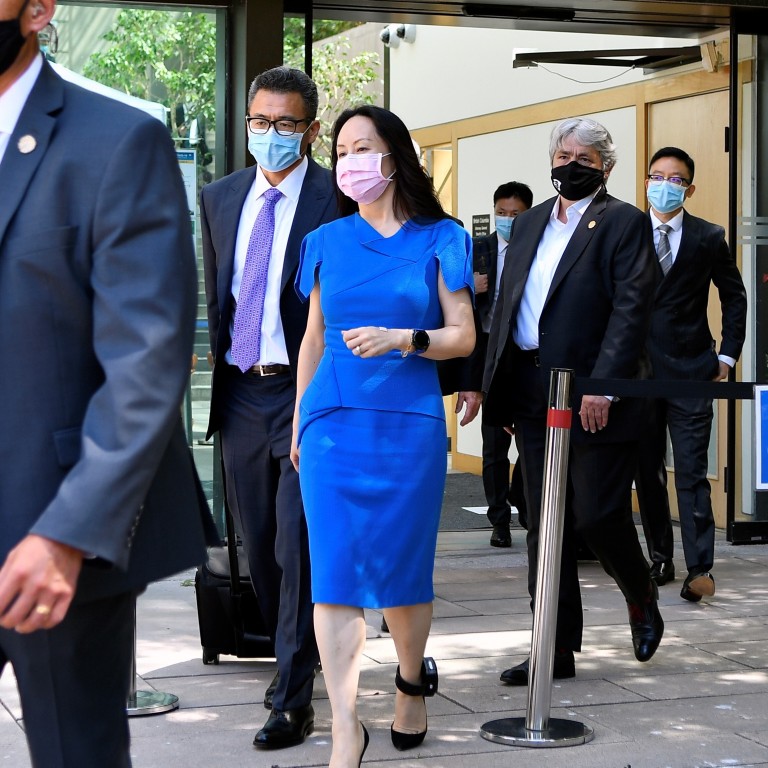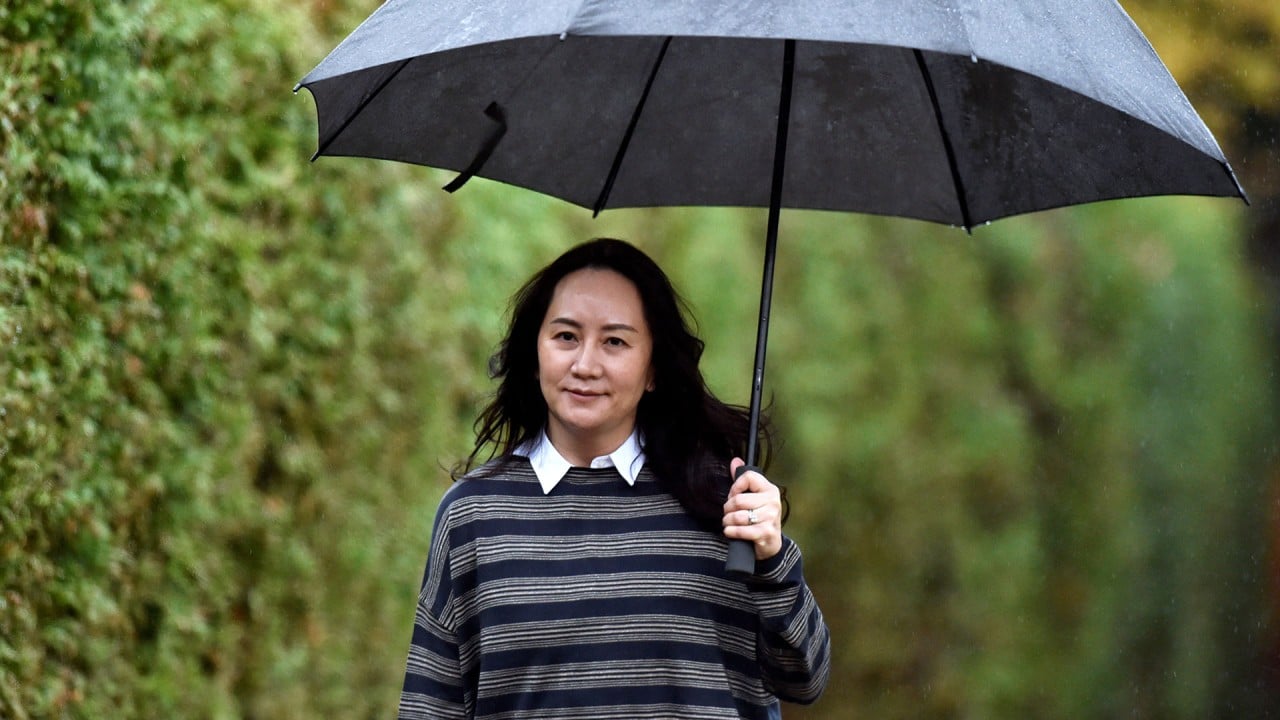
US acted ‘honourably’ in pursuit of Meng Wanzhou, Canadian government lawyer tells extradition hearing
- Huawei executive’s lawyers say the US tried to mislead the Supreme Court of British Columbia by omitting key evidence about its fraud case against her
- The government’s lawyers say ‘the mere absence’ of evidence from a US summary of its case does not establish misconduct, and Meng should not be released
US prosecutors pursuing Meng Wanzhou on fraud charges had acted “honourably”, and claims that they tried to mislead her extradition case in Vancouver were unsubstantiated, a Canadian government lawyer said on Thursday.
The final phase of the Huawei Technologies executive’s marathon extradition hearings began on Wednesday with her lawyers arguing that the process should be halted, releasing Meng, as the only remedy for the alleged US misconduct.
They contended that the Americans misled the Supreme Court of British Columbia with a faulty record of the case (ROC), a document that summarises why Meng was wanted for prosecution on fraud charges.
But government lawyer Monika Rahman told Associate Chief Justice Heather Holmes that “there is no evidence of anything other than what is presumed in extradition proceedings” – namely that the prosecution was being conducted in good faith.
In a written submission, Rahman and her colleagues representing US interests in the extradition case said that “[there] is no evidence that the Requesting State omitted evidence to mislead the Court, or that the ROCs were prepared in such a careless and cavalier manner as to be offensive to societal notions of fair play and decency.”

04:43
How the arrest of Huawei CFO Meng Wanzhou soured China's relations with the US and Canada
Meng is accused of defrauding HSBC by lying about Huawei’s business interests in Iran – which were conducted via an affiliate called Skycom – thus exposing the bank to the risk of breaching US sanctions on Tehran. The claim is centred on a PowerPoint presentation Meng gave to a HSBC banker in a Hong Kong teahouse in 2013.
But the original ROC submitted by the US Department of Justice omitted parts of the presentation in which Meng described Huawei as having a “controllable” business relationship with Skycom; this showed that no deception had occurred, and that the ROC was “manifestly unreliable”, her lawyers said on Wednesday.
“This Court should dissociate itself from such misconduct,” they said in a written submission. “The Requesting State‘s deliberately misleading ROCs disentitle it from the Court‘s assistance. A stay of proceedings is necessary.”
That would result in the release of Meng, who denies the US charges.
Denounce US conduct and set Meng free, Huawei executive’s lawyer tells judge
The Canadian government’s lawyers said that the claims of misconduct were based on documents Meng had obtained from HSBC, but which Holmes has already ruled should be excluded as evidence in the committal stage of the hearings.
“This Court has already concluded that most of the evidence the Applicant sought to adduce on this branch [of her argument] is irrelevant to the issue of committal,” they said in their submission.
“Omission of irrelevant evidence cannot establish misconduct, much less justify a stay of proceedings.”
The government submission said that while the US had to “conduct itself with candour and diligence”, it was not obliged to include everything it knew in the record of the case.
“A summary, by its nature, is a selection. It is designed to meet a requesting state’s limited burden on committal. The mere absence of certain evidence from the summary does not establish misconduct,” the submission said.
The meaning of “controllable” was open to interpretation, Rahman said, and its absence from the original record of the case did not represent a “material omission”.
The word “controllable” was, in any case, inconsistent with the rest of Meng’s presentation, Rahman added.
Meng’s lawyers have also said the ROC misleadingly suggested that only “junior” HSBC staff were aware of the true nature of Huawei’s relationship with Skycom, pointing to the job titles of executives who were part of email discussions on the subject.
But Rahman said the ROC’s distinction between junior and senior staff was a reference to “decision-making authority”.
Last year, Holmes ruled that the fraud charges against Meng satisfied the “double criminality” extradition requirement that demands a suspect be accused of something that would have constituted a crime had it been committed in Canada.
But the question of exactly how and whether HSBC was harmed by Meng has lingered over the extradition hearings: the case against her suggests the bank was being defrauded, but its potential loss only stemmed from its own possible prosecution by the US.
In a discussion on Thursday about the risk of deprivation – a necessary component of a fraud charge – Holmes said “surely … there is an obligation on the requesting state to decide whether HSBC is a victim or a potential accused, and not to offer both in the record of the case”.
Holmes said she would return to this question in the committal stage. Rahman laughingly demurred on the matter, saying she did not want to go further at the risk she might “disappoint Mr [Robert] Frater”, the Canadian Department of Justice’s top lawyer, who is heading the case in support of extradition.
The hearings may represent the endgame for an extradition case that began when Meng was arrested at Vancouver International Airport on a US warrant on December 1, 2018.
Huawei extradition battle: Meng Wanzhou and her narrow flight path to freedom
Meng is Huawei’s chief financial officer and a daughter of the company founder, Ren Zhengfei; her case has assumed huge symbolic importance in China. Her treatment outraged Beijing and triggered a crisis in China’s relations with Canada and the US.
Two Canadians, Michael Kovrig and Michael Spavor, were swiftly arrested in China, and were put on trial this year for espionage; verdicts have not been announced. Canada’s government has said the men are victims of “hostage diplomacy”.
The arguments about whether the US misled the court will be followed next week by committal hearings which could last until August 20. After that, Holmes is to decide whether to free Meng, who is living under partial house arrest, or recommend to Canadian Justice Minister David Lametti that she be sent to New York to face trial.
The court has already heard arguments about three other branches of Meng’s central claim that she is the victim of an abuse of process – that her prosecution is politically tainted, that Meng’s Canadian Charter rights were violated by police and border officers, and that her prosecution is contrary to international law.
Legal experts have said that Holmes’s eventual ruling is likely to be appealed, regardless of what she decides.
The hearing was adjourned until Friday.

